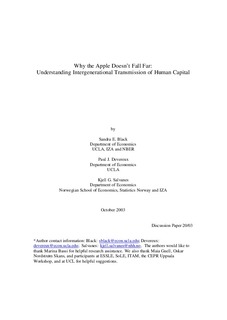| dc.contributor.author | Black, Sandra E. | |
| dc.contributor.author | Devereux, Paul J. | |
| dc.contributor.author | Salvanes, Kjell Gunnar | |
| dc.date.accessioned | 2006-08-08T07:15:40Z | |
| dc.date.available | 2006-08-08T07:15:40Z | |
| dc.date.issued | 2003-10 | |
| dc.identifier.issn | 0804-6824 | |
| dc.identifier.uri | http://hdl.handle.net/11250/162850 | |
| dc.description.abstract | Parents with higher education levels have children with higher education levels.
However, is this because parental education actually changes the outcomes of children,
suggesting an important spillover of education policies, or is it merely that more able
individuals who have higher education also have more able children? This paper
proposes to answer this question by using a unique dataset from Norway. Using the
reform of the education system that was implemented in different municipalities at
different times in the 1960s as an instrument for parental education, we find little
evidence of a causal relationship between parents’ education and children’s education,
despite significant OLS relationships. We find 2SLS estimates that are consistently lower
than the OLS estimates with the only statistically significant effect being a positive
relationship between mother's education and son's education. These findings suggest that
the high correlations between parents’ and children’s education are due primarily to selection and not causation. | en |
| dc.format.extent | 120722 bytes | |
| dc.format.mimetype | application/pdf | |
| dc.language.iso | eng | en |
| dc.publisher | Norwegian School of Economics and Business Administration. Department of Economics | en |
| dc.relation.ispartofseries | Discussion paper | en |
| dc.relation.ispartofseries | 2003:20 | en |
| dc.subject | intergenerational mobility | en |
| dc.subject | education | en |
| dc.subject | educational reform | en |
| dc.title | Why the apple doesn’t fall far : understanding intergenerational transmission of human capital | en |
| dc.type | Working paper | en |
